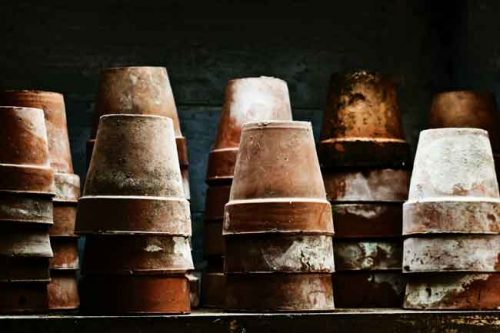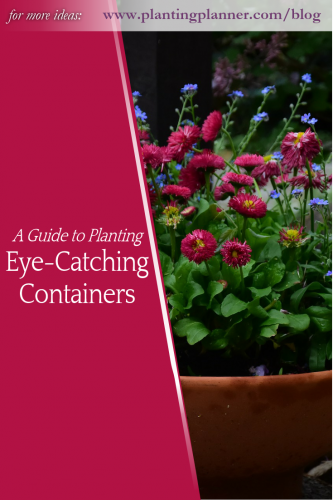from The Weatherstaff PlantingPlanner – intelligent garden design software
Planting up a container is a bit like designing a garden bed in miniature and the same design principles apply.
Colour
Get the colour scheme right. Nature’s soothing greens often make even unlikely plant groupings work, but don’t rely on that if you want your containers to sing. Decide whether you want harmonising or contrasting colours, pastels or rich hues.
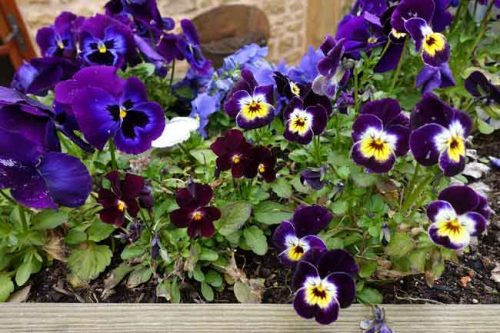
A group of pansies in varying hues of purple-blue make a soothing combination. The bright yellow eyes and different flower sizes maintain interest.
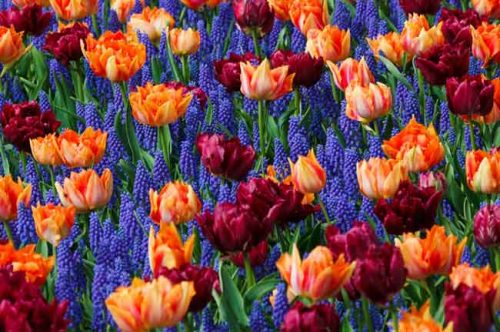
Vibrant clashes can work well – like this glorious combination of tulips and grape hyacinths.
But take care! When my new display of red summer pelargoniums suddenly took off, they clashed horribly with a pot of purple petunias. It’s an easy job to move one of the pots to join up with a new group of friends, but harder to separate shudder-inducing combinations if they’re sharing the same container.
Size and shape
You can plant up containers of any shape and style, whether your taste is traditional, contemporary or rustic.
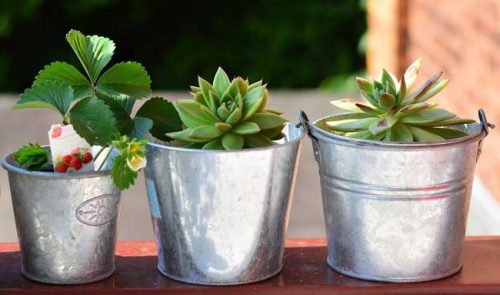
A row of small, matching pots looks great when planted up with similar plants.
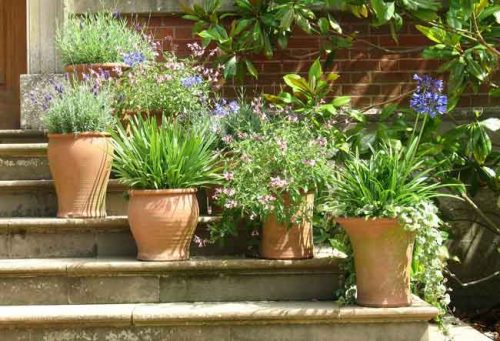
This medley of sizes, shapes and planting combinations works well because the containers are all terracotta.
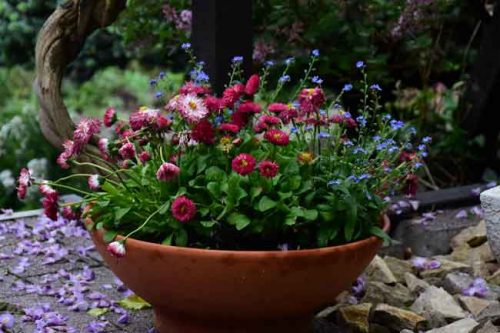
Small or shallow pots can dry out quickly so are best used for displays of small plants.
A larger container gives more space for compost and roots, as well as needing less frequent watering. Pots big enough to house a collection of plants provide endless scope for experimenting with combinations – just as a larger garden border gives plenty of opportunity for playing with layers and textures.
Structure
The ‘Thriller, Filler, Spiller’ technique is a useful reminder of the types of plants to include.
The thriller plant is the one to fulfil the architectural role in your pot. It should add vertical height and drama to the display.
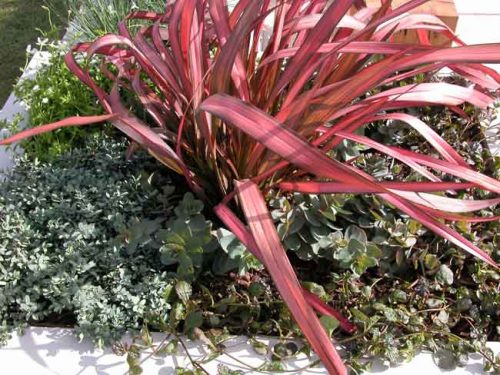
Stunning phormiums, with their colourful strappy foliage, are perfect ‘thriller’ plants and continue to provide structure in the winter months.
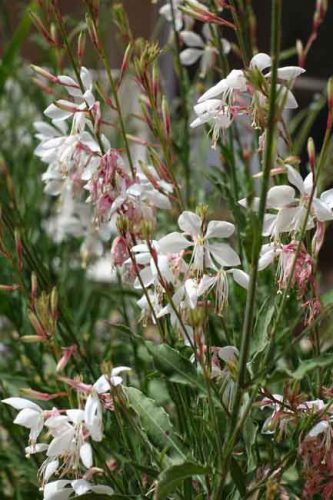
A tall, summer flowering star-performer, like Gaura, will fit the bill too. If the display is to go the distance, though, you will need to consider what will replace this drama queen in its declining days.
Mounds
You need mounds to contrast with spires. These are the fillers, the second storey of planting in the container, planted around or in front of the thrillers. They can be billowy, adding a contrasting texture and filling out the scheme. Long-flowering geraniums are perfect for this.
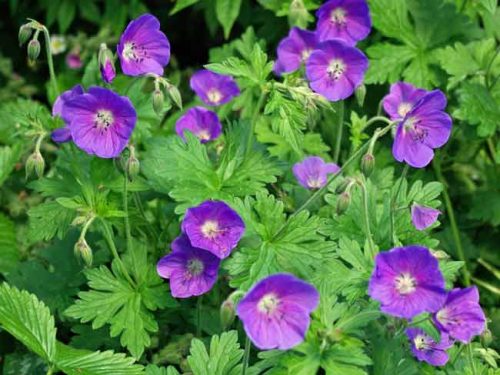
Geranium himalayense ‘Gravetye’ has violet-blue, summer flowers. It flowers in summer, but often flowers again intermittently into the autumn.
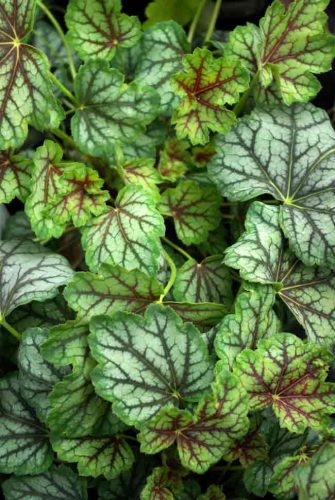
Evergreen heuchera, with variegated foliage in colours to match every scheme, also works well to fill out the planting. ‘Green Spice’ has silver-green foliage with plum markings around the veins. Wiry stems of tiny, white flowers appear in summer.
Trailing plants
In the garden border, the little ground covers knit the plants together as they weave their way through the planting. In container planting, the spillers have the same role, tying the elements together and anchoring the container to the garden. The spillers are the trailing plants which, when squeezed in around the edge of the planting, will tumble over the sides and soften the boundaries.
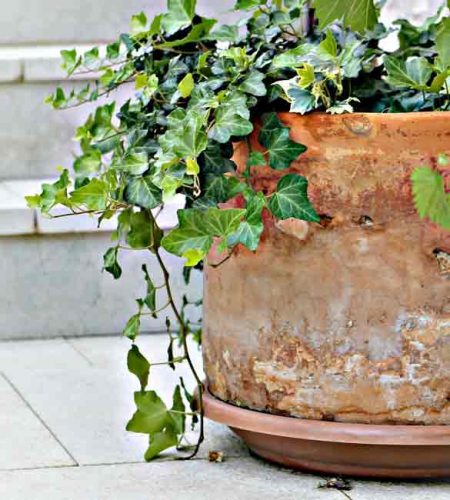
One season dazzler or all year-round interest?
If you have a collection of pots, with space to move them around, you may want to create a stunning display for just one season.
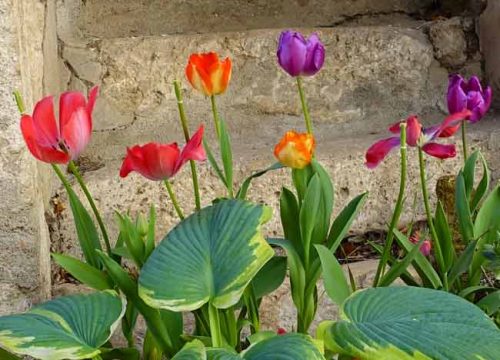
A massed planting of spring bulbs looks fantastic early in the year. And when they die down, you can move the pot to a quiet corner or plant the bulbs in the garden.
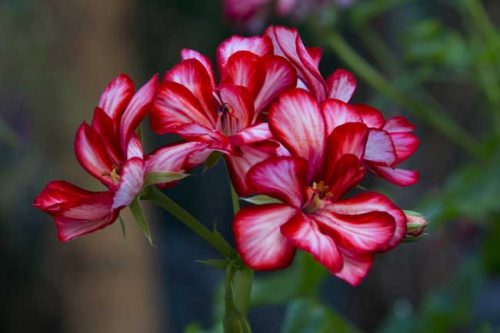
Summer bedding, either annuals or frost-tender perennials, will flower prolifically for months before needing to be replaced.
On the other hand, because of time or space constrictions, you may want to plant up a pot which is more enduring. In this case, you will need to choose plants which will provide interest at different times of the year and with at least one evergreen for winter colour.
Pin for later
For more gardening ideas, click here to follow the Weatherstaff PlantingPlanner on Pinterest.


